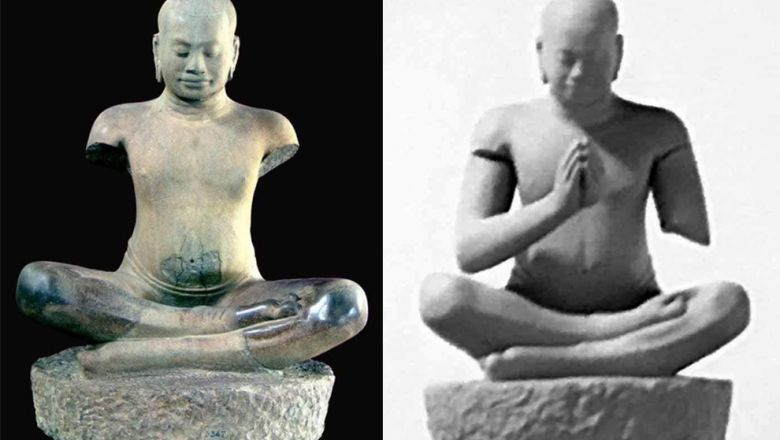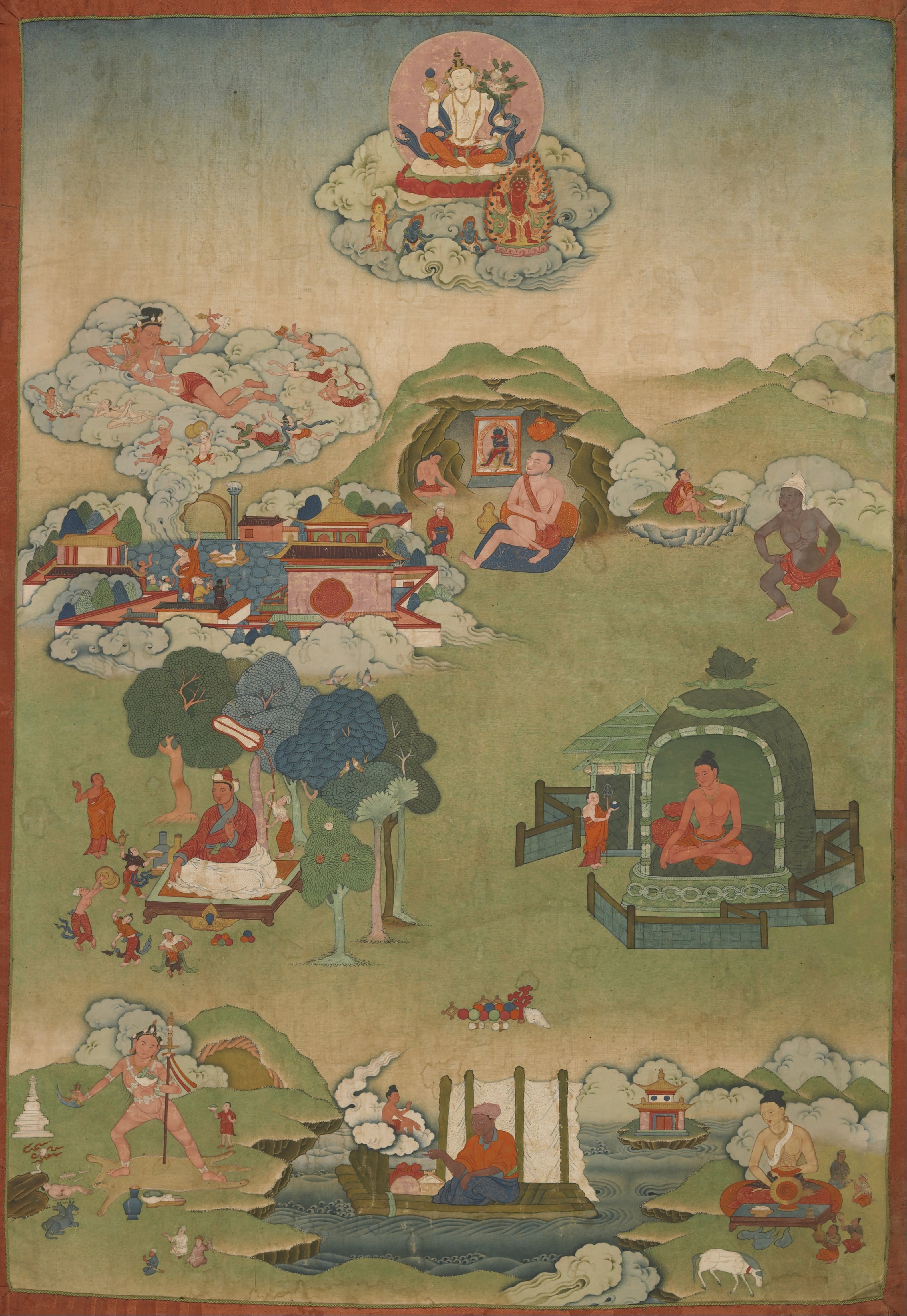|
Vidyanandana
Vidyanandana, Shri Suryavarmadeva, or Suryavarman, was a Cham prince in Cambodia, who in 1182 put down a revolt that broke out at Malyang against Jayavarman VII. He arrived in Jayavarman VII's court in 1182 from Tumpraukvijaya, and was educated as a prince "in all branches of knowledge and all weapons". In 1190 he took part in the war against Champa and seized the capital Vijaya, capturing King Jaya Indravarman IV. Adopting the title of Shri Suryavarmadeva, he made himself king of Panduranga. He made Prince In, a brother-in-law of Jayavarman VII, "King Suryajayavarmadeva in the Nagara of Vijaya" (or Suryajayavarman).Maspero, G., 2002, The Champa Kingdom, Bangkok: White Lotus Co., Ltd., In 1191, Jaya Indravarman oṅ Vatuv summoned troops from Amaravati, Ulik, Vvyar, Jriy and Traik, deciding to revolt against Khmer rule. Indravarman oṅ Vatuv and his rebels drove Suryajayavarmadeva back to Cambodia, enthroning himself as Jaya Indravarman V. Vidyanandana/Suryavarman also then r ... [...More Info...] [...Related Items...] OR: [Wikipedia] [Google] [Baidu] |
Jaya Indravarman IV
Jaya Indravarman IV was the king of Champa, a former region located within modern-day Vietnam, from 1167–1192. He probably was the same person as Panduranga ruler, Po Klong Garai. A usurper, "he called himself Jaya Indravarman on Vatu and said he came from the 'famous place known by the name Gramapuravijaya." He was "full of energy, courage and pride...well versed in all the shastra." He sent tribute to the Court of China and the Dai Viet. Unsuccessful in purchasing horses from China for an overland invasion, he prepared a squadron of water vessels.Maspero, G., 2002, The Champa Kingdom, Bangkok: White Lotus Co., Ltd., He is noted for leading the Champa invasion of the Khmer Empire in 1177. His naval forces traveled up the Mekong and Tonle Sap rivers to Tonle Sap and sacked Angkor, killing Tribhuvanadityavarman.Higham, C., 2001, The Civilization of Angkor, London: Weidenfeld & Nicolson, One of Indravarman IV's inscriptions erected in the Po Nagar temple dated to 1183 rec ... [...More Info...] [...Related Items...] OR: [Wikipedia] [Google] [Baidu] |
Lý Cao Tông
Lý Cao Tông (6 July 1173 – 15 November 1210), born Lý Long Trát, courtesy name Long Cán, was the seventh emperor of the Lý dynasty, ruled Đại Việt for 35 years. He identified himself with Buddha, similar with Angkorian Khmer Empire contemporary counterpart Jayavarman VII. Some consider his reign to begin the fall into decay of the Lý dynasty because of his erroneous determinations. However, many historians agree that he had an important influence in Vietnamese history. Early life He was the sixth son of Lý Anh Tông. His mother was Đỗ Thụy Châu who later became Empress Dowager Đỗ. He was born Lý Long Cán (or Trát) on May 25, 1173, according to the Eastern calendar. He was enthroned when he was very young, at the age of three, as one of the youngest Emperors in Vietnam's history. Prior to this, his predecessor Emperor Lý Anh Tông disposed the former Crown Prince Long Xưởng and replaced Prince Cán with this title. Tô Hiến Thành was trusted to bec ... [...More Info...] [...Related Items...] OR: [Wikipedia] [Google] [Baidu] |
King Of Champa
King of Champa is the title ruler of Champa. Champa rulers often use two Hinduist style titles: ''raja-di-raja'' ( "king of kings"; written here in Devanagari since the Cham used their own Cham script) or ''po-tana-raya'' ("lord of all territories"). The regnal name of the Champa rulers originated from the Hindu tradition, often consisting of titles and aliases. Titles (prefix) like: Jaya ( "victory"), Maha ( "great"), Sri ( "glory"). Aliases (stem) like: Bhadravarman, Vikrantavarman, Rudravarman, Simhavarman, Indravarman, Paramesvaravarman, Harivarman... Among them, the suffix -varman belongs to the warrior class and is only for those leaders of the Champa Alliance. The last king of Champa was deposed by Minh Mạng in 1832.Quốc sử quán triều Nguyễn, Cao Xuân Dục (chủ biên) ''Quốc triều chánh biên toát yếu'', 1908, quyển III, trang 81. List of kings of Champa Lâm Ấp (Liu) (192 - 757) Hoàn Vương (Panduranga) (757 - 859) Chiêm Thành ( ... [...More Info...] [...Related Items...] OR: [Wikipedia] [Google] [Baidu] |
Jayavarman VII
Jayavarman VII (), known posthumously as Mahaparamasaugata (, c. 1122–1218), was king of the Khmer Empire. He was the son of King Dharanindravarman II (r. 1150–1160) and Queen Sri Jayarajacudamani. He was the first king devoted to Buddhism, as only one prior Khmer king had been a Buddhist. He then built the Bayon as a monument to Buddhism. Jayavarman VII is generally considered the most powerful of the Khmer monarchs by historians. His government built many projects including hospitals, highways, rest houses, and temples. With Buddhism as his motivation, King Jayavarman VII is credited with introducing a welfare state that served the physical and spiritual needs of the Khmer people. Defeat of the Cham and coronation In 1177 and again in 1178, the Champa, Cham invaded the Khmer Empire. In 1177, Champa King Jaya Indravarman IV launched a surprise attack on the Khmer capital by sailing a fleet up the Mekong River, across Lake Tonlé Sap, and then up the Siem Reap River, a t ... [...More Info...] [...Related Items...] OR: [Wikipedia] [Google] [Baidu] |
Phan Rang
Phan may refer to: * Phan (surname), a Vietnamese family name * Phan District, Chiang Rai Province, Thailand * Phan River The Phan River () is a river of Bình Thuận Province, Vietnam.Vietnam Administrative Atlas, NXB Bản Đồ, 2004 It flows for 55 kilometres. References Rivers of Bình Thuận province Rivers of Vietnam {{Vietnam-river-stub ..., Bình Thuận Province, Vietnam * Phan (tray), a tray with a pedestal, used often for ritual offerings {{Disambiguation ... [...More Info...] [...Related Items...] OR: [Wikipedia] [Google] [Baidu] |
Dai Viet
Dai may refer to: Names * Dai (given name), a Welsh or Japanese masculine given name * Dai (surname) (戴), a Chinese surname * Bảo Đại (保大), Emperor of Vietnam from 1926 to 1945 Places and regimes * Dai Commandery, a commandery of the state of Zhao and in early imperial China * Dai County, in Xinzhou, Shanxi, China * Dai (Eighteen Kingdoms), a short-lived state during the Eighteen Kingdoms period in Chinese history * Dai (Han dynasty), a realm and title during the Han dynasty * Dai (Sixteen Kingdoms), a Xianbei-led dynastic state during the Sixteen Kingdoms era of Chinese history * Dai (Spring and Autumn period), a state during the Spring and Autumn period in Chinese history * Dai (Warring States period), a short-lived state during the Warring States period in Chinese history People and language * Da'i al-Mutlaq, or Da'i, a type of religious leader in Islam * Da'i, person engaging in Dawah, the act of inviting people to Islam * Dai language (other) ... [...More Info...] [...Related Items...] OR: [Wikipedia] [Google] [Baidu] |
Hinduism In Vietnam
Hinduism in Vietnam is mainly observed by the Balamon Cham people in Vietnam. According to the 2019 census, there are 64,547 Cham Hindus in Vietnam.Bieu so lieu va phu luc (duyet gui in) US State Dept 2022 report /ref> Cham Hindus  The majority of Cham in
The majority of Cham in
|
Tantric Buddhism
''Vajrayāna'' (; 'vajra vehicle'), also known as Mantrayāna ('mantra vehicle'), Guhyamantrayāna ('secret mantra vehicle'), Tantrayāna ('tantra vehicle'), Tantric Buddhism, and Esoteric Buddhism, is a Mahāyāna Buddhist tradition that emphasizes esoteric practices and rituals aimed at rapid spiritual awakening. Emerging between the 5th and 7th centuries CE in medieval India, Vajrayāna incorporates a range of techniques, including the use of mantras (sacred sounds), dhāraṇīs (mnemonic codes), mudrās (symbolic hand gestures), mandalas (spiritual diagrams), and the visualization of deities and Buddhas. These practices are designed to transform ordinary experiences into paths toward enlightenment, often by engaging with aspects of desire and aversion in a ritualized context. A distinctive feature of Vajrayāna is its emphasis on esoteric transmission, where teachings are passed directly from teacher (guru or vajrācārya) to student through initiation ceremonies. ... [...More Info...] [...Related Items...] OR: [Wikipedia] [Google] [Baidu] |
Cham People
The Chams (Cham language, Cham: , چام, ''cam''), or Champa people (Cham language, Cham: , اوراڠ چمڤا, ''Urang Campa''; or ; , ), are an Austronesian peoples, Austronesian ethnic group in Southeast Asia and are the original inhabitants of central Vietnam and coastal Cambodia before the arrival of the Cambodians and Vietnamese, during the expansion of the Khmer Empire (802–1431) and the Vietnamese conquest of Champa (11th–19th century). From the 2nd century, the Chams founded Champa, a collection of independent Hindu-Buddhist principalities in what is now central and southern Vietnam. By the 17th century, Champa became an Islamic sultanate. Today, the Cham people are largely Muslim, with a minority following Hinduism, both formed the indigenous Muslim and Hindu population in both Cambodia and Vietnam. Despite their adherence to Islam, the Cham people still retain their ancestral practice of matriarchy in family and inheritance. The Cham people speak Cham langua ... [...More Info...] [...Related Items...] OR: [Wikipedia] [Google] [Baidu] |
Cambodia
Cambodia, officially the Kingdom of Cambodia, is a country in Southeast Asia on the Mainland Southeast Asia, Indochinese Peninsula. It is bordered by Thailand to the northwest, Laos to the north, and Vietnam to the east, and has a coastline along the Gulf of Thailand in the southwest. It spans an area of , dominated by a low-lying plain and the confluence of the Mekong river and Tonlé Sap, Southeast Asia's largest lake. It is dominated by a tropical climate and is rich in biodiversity. Cambodia has a population of about 17 million people, the majority of which are ethnically Khmer people, Khmer. Its capital and most populous city is Phnom Penh, followed by Siem Reap and Battambang. In 802 AD, Jayavarman II declared himself king, uniting the warring Khmer princes of Chenla Kingdom, Chenla under the name "Kambuja".Chandler, David P. (1992) ''History of Cambodia''. Boulder, CO: Westview Press, . This marked the beginning of the Khmer Empire. The Indianised kingdom facilitated ... [...More Info...] [...Related Items...] OR: [Wikipedia] [Google] [Baidu] |
Vijaya (Champa)
Vijaya (Sanskrit for "victorious"), also known as Vijayapura, was the capital of the Kingdom of Champa located in modern-day Bình Định province, Vietnam. It served as the capital of the Kingdom of Champa from the 12th century CE until it was conquered by Đại Việt during the Cham–Vietnamese War (1471), Champa–Dai Viet War of 1471. History The area around Vijaya was probably one of earliest landfalls of the Chams, Cham people in what is now Vietnam.Vickery 2009, p. 47 However, its architecture implies that it did not become important until the 11th or 12th century. Records suggest that there was an attack on Vijaya's citadel from the Vietnamese in 1069 (when Dai Viet was ruled by Lý Nhân Tông) to punish Champa for armed raiding in Vietnam. The Cham king Rudravarman III was defeated and captured and offered Champa's three northern provinces to Dai Viet (present-day Quảng Bình Province, Quảng Bình and Quảng Trị Province, Quảng Trị provinces).Maspero, G. ... [...More Info...] [...Related Items...] OR: [Wikipedia] [Google] [Baidu] |
Jaya Indravarman Oṅ Vatuv
Jaya may refer to: Media *''Jaya'', self titled albums by Jaya (singer), released in 1989, 1996 and 2001 * ''Jaya'' (film), a 2002 Indian Tamil film Hindu mythology *''Jaya'', a Sanskrit term meaning victorious *'' Jaya Samhita'', an earlier name of the epic ''Mahabharata'', considered to form its core portion *Jaya, a name of Karna in the ''Mahabharata'' *Jaya-Vijaya, the door-keepers of Vaikuntha, the realm of the god Vishnu in Hindu mythology *Jaya, consort of Kalki People * Jaya (given name), list of people with this name, or names derived from it *Jaya (singer) (born 1970), Filipina soul singer Places Fictional places *Jaya, an island in Oda Eiichiro's manga and anime series ''One Piece'' Indonesia *Aceh Jaya Regency, Aceh *Bintaro Jaya, a real-estate in the outskirts of Jakarta *Jakarta, comes from the name: ''Jayakarta'' which means "victorious city". *Jayapura, a capital and largest city of the Indonesian province of Papua *Jayawijaya Regency, Highland Papua ... [...More Info...] [...Related Items...] OR: [Wikipedia] [Google] [Baidu] |



